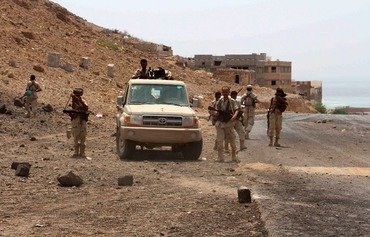Residents of Yemen's Hadramaut province told Al-Mashareq they look forward to the day when their province is completely free of al-Qaeda remnants.
Al-Qaeda seized the Hadramaut provincial capital of al-Mukalla and a number of cities along the coast in April 2015, and controlled these areas until it was driven out by Hadramaut elite forces and the Arab coalition in April 2016.
The province is administratively divided into Hadramaut Coast and Hadramaut Valley, where al-Qaeda remnants continue to target Yemeni forces with sporadic attacks.
Hadramaut elite forces, which control Hadramaut Coast, have largely been successful in thwarting such attacks before they can be carried out, according to the province's security services.
According to Hadramaut governor Maj. Gen. Faraj al-Bahsani, the Arab coalition, Hadramaut elite forces and the local population have been working together to purge the province of terrorist remnants.
'Al-Mukalla wore black'
"Al-Mukalla wore black after al-Qaeda took over in April 2015," private sector worker Ali al-Habashi told Al-Mashareq.
"Black flags started to be seen, as if to allude to black days, because of the strict rules [the group] imposed on citizens by force and intimidation," he said, noting that this was done under the guise of imposing sharia.
Al-Qaeda elements engaged in abuses such as torture and flogging, he said, with some punishments even resulting in death.
Under the group's harsh rule, al-Mukalla was transformed into a city of fear and terror, that made its population wish to leave for safer areas, al-Habashi said.
He praised the role of the Hadramaut elite forces and Arab coalition in clearing al-Qaeda from the coastal cities.
"Joy and signs of happiness are back on people’s faces," he said, noting that the Hadramaut elite forces have managed to consolidate security, allowing for the gradual restoration of services.
Journalist Hadba Mohammed told Al-Mashareq she hopes to see security and stability return to the districts of Hadramaut Valley, "which are still suffering from the presence of al-Qaeda elements".
Oppression under al-Qaeda
Mohammed recalled how women suffered under al-Qaeda's rule.
"We women have been more affected by these terrorist elements because of the fear and anxiety they have caused, their raiding of homes, intimidation of women and arrest of a family member, for whatever accusation," she said.
Women were oppressed by al-Qaeda, she said, pointing to the group's ban on weddings in function halls and community centres, as well as its ban on singing.
The group restricted and monitored the movement of women in markets, confining their activity to certain hours of the day, she said, "in addition to requiring a chaperon to be present".
Men also suffered at the hands of al-Qaeda, Mohammed said.
"Every Friday we were surprised by people being beaten for charges such as adultery or drinking alcohol," she said.
'The worst kinds of abuses'
"After they took control of al-Mukalla, al-Qaeda elements began to seize banks and customers’ deposits and commandeer the local authority’s resources," said Mohamed Omar, who works as a teacher.
The group began "cutting services to citizens, instead of developing and improving them", he told Al-Mashareq, as well as committing the worst kinds of abuses, which included "executions, flogging and cutting off hands".
Al-Qaeda's procedures were "not recognised by society", Omar said, adding that the group also killed residents on other charges, including sorcery.
"The abuses and injustice exercised [by al-Qaeda] were a catalyst for the population to help the Hadramaut elite forces and Arab coalition forces," he said, noting that residents rose up against the group in coastal districts.
Omar said he looks forward to the day when all Hadramaut districts are purged of al-Qaeda elements, who are trying to exploit opportunities to engage in attacks that aim to disrupt security and stability.
Improving Hadramaut's security
"The local authority is making great efforts to improve the security situation, under the supervision of the governor," Hadramaut deputy governor Abd al-Hadi al-Tamimi told Al-Mashareq.
There is not a large enough security presence in Hadramaut Valley, however, to "cope with all the terrorist plots of al-Qaeda elements, who are trying to carry out an operation here or there against a security post or base", he said.
"The province’s leadership is working hard to improve the security situation and hunt down the terrorist elements," al-Tamimi said, adding that al-Qaeda has been taking advantage of Hadramaut’s vast geographic area to launch attacks.
He expressed his hope that security and stability can be restored in the valley districts "as is the case in the coastal districts".

![Yemeni soldiers check the scene of a car bomb attack at an army checkpoint near Hajr, west of the Hadramaut provincial capital of al-Mukalla, on July 18th, 2016, after suicide bombers attacked two army checkpoints in a former al-Qaeda stronghold, killing 11 people. [Abduljabbar Bajubair/AFP]](/cnmi_am/images/2018/01/01/10892-Yemen-Hadramaut-Mukalla-600_384.jpg)






